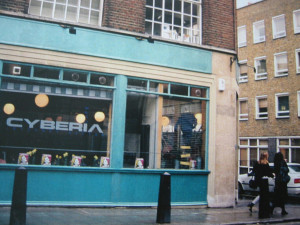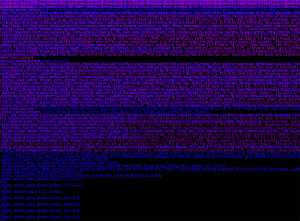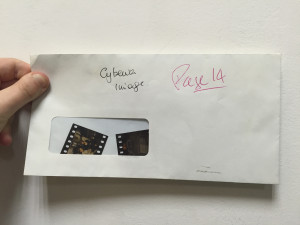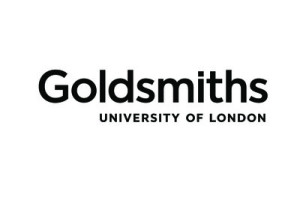Cybernetic Resistance: Feminism, the Archive and the first Internet Café
– ,



Performance night, 11 November, 6–9 pm
Open Day, 12 November, 12–6 pm
A project by Brenda Guesnet and Kiona Hagen Niehaus the recipients of the 2016 Women’s Art Library and Feminist Review Living with Make: Art in the Archive Research Bursary, supported by The Showroom
‘Cybernetic Resistance’ evokes ‘CYBERIA’, the first Internet Café of its kind, founded in London in 1994 as a space for women to share skills and resources surrounding the use of the web. This two-day event at The Showroom revisits this optimistic feminist moment as a setting for performances, artworks and public conversations, exploring whether the Internet Café can help us to imagine a utopian space for specific communities to gather and organise towards their respective goals.
Performance Night, 11 November, 6–9 pm
Join us for a reception with performances by Kiona Hagen Niehaus, Erica Scourti, and Paul Maheke. The artists imagine a communal sense of belonging by intertwining instant and mediated forms of communication, blurring the boundaries of physical and digital presence.
Open Day, 12 November, 12–6 pm
Visit the Internet Café with works by Kiona Hagen Niehaus and others, explore documents from the Women’s Art Library, attend public conversations with various local organisers, and contribute to an ‘Internet Café Kit’ that will be stored permanently in the Women’s Art Library and be downloadable online.
Public conversation schedule
Brenda Guesnet and Kiona Hagen Niehaus interview local organisations involved in feminist, queer, and anti-austerity activism about their own politics of space-making and their potential relationship to a utopian Internet Café. These informal talks aim to activate the communal space and are open to the public to attend and participate in.
1 - 1.45 pm: Aviah Sarah Day and Rosamund Liebeskind, Sisters Uncut
2 - 2.45 pm: Phoenix Perry, Code Liberation
3 - 3.45 pm: Sex Worker Open University
4.30 - 5.15 pm: Xana
Ever heard of CYBERIA? Judging by the small, blurry, picture of its shop front, paired with a cringe-inducing pun for a name, we might easily draw the conclusion that it was nothing more than a geeky gimmick.
In fact, CYBERIA marks a striking moment in the mid-90’s: it was the first commercial Internet Café in the world. Founded by Polish MA student Eva Pascoe and located in the heart of London, CYBERIA was set up specifically as a space for women to share knowledge and resources surrounding the strange new world that was the Internet in 1994. Although the café quickly became so popular that the women-only policy was abandoned, the project resonates with the optimism many feminists had at the time regarding online spaces and virtual reality. These technologies seemed to offer the possibility to escape the restrictions of our bodies and the oppressions imposed upon them, and to inhabit a world where anything, including a feminist utopia, was possible.
More than twenty years later, Internet Cafés are disappearing spaces by many definitions. Most of us no longer have to be physically present in a specific room in order to be online, and it has become impossible to draw a clear line between our ‘virtual’ and our ‘offline’ lives. And while online spaces have certainly allowed many groups within feminism to form and thrive, we also know that power imbalances in the ‘real world’ are reproduced, if not heightened, on virtual platforms.
We therefore ask if the Internet Café, in the initial spirit of CYBERIA, can function (again) as a common, utopian space for communities to share ideas, tools and knowledge, as well as to have access, through the Internet, to resources that lie outside of its physical space. Is it possible to recover ‘the Internet’ as a common good? Is this useful or worthwhile to artists and organisers involved in feminist, queer, anti-racist work? In short, can we envision a community-oriented, cybernetic resistance in our contemporary urban context? This ongoing investigation is showcased through a prototype Internet Café space, artworks, performances, and public conversations with experts and activists. The public is invited to contribute ideas and objects to an ‘Internet Café Kit’, which will be permanently stored in the Women’s Art Library and loanable to anyone who wishes to use it, as well as downloadable online.
BIOS:
The Women's Art Library began as an artists’ initiative that developed into an arts organization publishing catalogues and books as well as a magazine from the early 1980s to 2002. The main purpose however was to provide a place for women artists to deposit unique documentation of their work. WAL collected personal files that functioned together as an alternative public space to view and experience women’s art. Thousands of artists from around the world are represented in some form in this collection.
Brenda Guesnet is a curator based in London. She is currently completing an MFA in Curating at Goldsmiths and working at Tenderpixel Gallery, while developing and realising independent curatorial projects with her collective ANGL. She has previously worked with arts organisations such as Prince Claus Fund and Amsterdam Art and been active as a feminist organiser and writer. Her interests revolve around the intersections of history, magic, and the marginal. Brenda also has a podcast called snakesoup where she interviews artists about their obsessions: snakesouppodcast.tumblr.com
Kiona Hagen Niehaus is a computational artist, photographer, and writer living in London. She is currently a PhD student in the Computing department at Goldsmiths. Kiona obtained a BFA in Photography and a minor in Art History from Pratt Institute in 2013, and subsequently moved to Berlin, Germany. Driven by the desire to make her visual work interactive, she completed an MFA in Computational Arts at Goldsmiths in 2016. Her artistic work spans photography, video, digital modeling, and sensor and code-based media. She uses her own experiences as a queer woman to discuss community and societal dynamics related to gender and sexuality, among other topics. kh-niehaus.com
Paul Maheke works and lives in London. His practice focuses – through video, installation and sculpture – on the body as both an archive and a territory. With particular attention to dance, he proposes to defuse the power relations that shape Western imaginations. Recent and upcoming shows include: I Lost of The Swarm, South London Gallery (2016); Green Ray Turns Out To Be Mauve, Green Ray, London (2016); Center, Berlin (Dec. 2016); What Flows Through and Across, Assembly Point (London, Jan. 2017); Hypersea, Turner Contemporary, Margate (Nov. 2016); Artist Talks: Paul Maheke, The Serpentine Galleries (Dec. 2016). paulmaheke.com
Erica Scourti was born in Athens and is now based in London and Athens. Drawing on personal experience to explore life, labour, and gender in a fully mediated, networked world, her work in performance, text and video has been shown internationally at spaces like Microscope Gallery, New York, The Photographers’ Gallery, London, Munich Kunstverein, EMST Athens, and South London Gallery. Her current commission for Bedlam: The Asylum and Beyond at the Wellcome Collection is on view til January 2017 (and online @empathydeck). ericascourti.com
Sisters Uncut is a feminist direct-action group fighting cuts to domestic violence services in the UK. Aviah Sarah Day and Rosamund Liebeskind were both part of the recently completed nine-week reclamation of a council flat in Hackney by the East End division of Sisters Uncut. The reclamation protested the lack of affordable housing offered to domestic violence survivors and demanded that empty council flats be made available to women fleeing domestic abuse. sistersuncut.org
Code Liberation was founded in 2012 by Phoenix Perry with the aim of teaching women, nonbinary, femme, and girl-identifying people to program for free. Most recently the UK chapter is giving workshops on games programming in the context of the V&A’s ‘Parallel Worlds’, a new videogame design conference. codeliberation.org
Xana is a live loop musician, sound designer, installation artist and front-end developer who creates inter-genre soundscapes through beatbox, vocal harmonies, archived sound and poetry. Xana undresses the politics of gender, coupling it with futurism and migration. Xana focuses on how we can use sound archiving and interactive performance to deconstruct oppressive institutional structures and build representative digital platforms. Xa-na.com
Sex Worker Open University is a project created by and for sex workers. SWOU is a place to socialise, learn new skills, get support and campaign for the rights and safety of everyone who sells sex or sexual services. The group’s aim is to build community and organise sex workers’ workplaces through drop-in sessions, workshops, actions and art projects, as well as fighting against criminalisation. sexworkeropenuniversity.com

